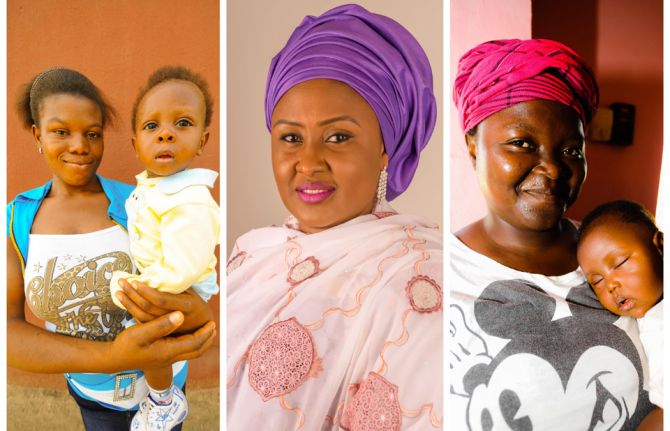

Feature Story
Aisha Muhammadu Buhari to ensure that no child is born with HIV in Nigeria by 2020
26 March 2018
26 March 2018 26 March 2018The wife of the President of Nigeria, Aisha Muhammadu Buhari—the new UNAIDS Special Ambassador for the Elimination of Mother-to-Child Transmission of HIV and the Promotion of Treatment for Children Living with HIV in Nigeria—has vowed to end mother-to-child transmission of HIV in the country.
“It is with a great sense of responsibility and humility that I accept the honour to serve as a UNAIDS Special Ambassador. I am looking forward to using my voice to help ensure that no child is born with HIV in Nigeria by 2020,” said Ms Buhari, upon commencement of her new role.
Nigeria has one of the highest rates of new HIV infections among children in the world. In 2016, an estimated 37 000 [22 000–56 000] children were newly infected with HIV and 24 000 [14 000–37 000) children died of AIDS-related illnesses. Around 270 000 children [180 000–380 000] children were living with HIV in 2016, and just 32% of pregnant women living with HIV had access to antiretroviral medicines to prevent transmitting the virus to their child.
“I am privileged to announce Aisha Muhammadu Buhari’s acceptance of the appointment as UNAIDS Special Ambassador for Nigeria. The trust and respect that she commands in the country will help us to quicken the pace of stopping new HIV infections among children as well as ensuring treatment for all children living with HIV,” said Michel Sidibé, the Executive Director of UNAIDS.
The appointment of Ms Buhari will reinforce recent efforts to scale up the response to HIV in Nigeria. In December 2016, the President of Nigeria, Muhammadu Buhari, launched a Fast-Track plan that includes using domestic resources to maintain 60 000 people living with HIV on treatment and to ensure that an additional 50 000 people can access treatment each year.
“We are delighted that her excellency has accepted this important role of UNAIDS Special Ambassador. The goal of eliminating mother-to-child transmission of HIV in Nigeria is a laudable one. It must be achieved,” said Pauline Tallen, the Board Chairperson of the National Agency for the Control of AIDS, Nigeria.
Ms Buhari is a passionate advocate for the rights of vulnerable women and girls. During her one-year tenure, she will advocate for increased access to antenatal care services and HIV testing for all pregnant women and their linkage to adequate treatment and care. She will also advocate for an increase in domestic resources for the HIV response at the federal and state levels.
“My three lovely children are all HIV-free because I benefited from prevention of mother-to-child transmission of HIV services. All pregnant women living with HIV in Nigeria deserve children who are born free from the virus, and the new UNAIDS Special Ambassador’s voice can help us make a huge difference. She is now in a strong position to advocate for free prevention of mother-to-child transmission of HIV services in the country,” said Lucy Attah Enyia, a beneficiary of prevention of mother-to-child transmission of HIV services.
A formal ceremony to commemorate Ms Buhari’s acceptance of her appointment will take place during the visit of Mr Sidibé to Abuja, Nigeria, in April 2018.
Region/country
Related
 Impact of the pause of US foreign assistance in Côte d'Ivoire
Impact of the pause of US foreign assistance in Côte d'Ivoire

19 February 2025


